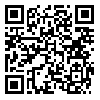Volume 33, Issue 2 (Spring 2025)
Avicenna J Nurs Midwifery Care 2025, 33(2): 92-104 |
Back to browse issues page
Ethics code: IR.HUMS.REC.1401.212
Download citation:
BibTeX | RIS | EndNote | Medlars | ProCite | Reference Manager | RefWorks
Send citation to:



BibTeX | RIS | EndNote | Medlars | ProCite | Reference Manager | RefWorks
Send citation to:
kianpouri S, Azizi S, Hosseini Teshnizi S, Yousefi P, Faghih A. Effect of Peers Group on the Self-Efficacy of Adolescents with Thalassemia: A Randomized Clinical Trial. Avicenna J Nurs Midwifery Care 2025; 33 (2) :92-104
URL: http://nmj.umsha.ac.ir/article-1-3123-en.html
URL: http://nmj.umsha.ac.ir/article-1-3123-en.html
1- Student Research Committee, Faculty of Nursing and Midwifery, Hormozgan University of Medical Sciences, Bandar Abbas, Iran
2- Department of Nursing, Faculty of Nursing and Midwifery, Hormozgan University of Medical Sciences, Bandar Abbas, Iran & Mother and Child Welfare Research Center, Hormozgan University of Medical Sciences, Bandar Abbas, Iran
3- Mother and Child Welfare Research Center, Hormozgan University of Medical Sciences, Bandar Abbas, Iran
4- Department of Nursing, Faculty of Nursing and Midwifery, Hormozgan University of Medical Sciences, Bandar Abbas, Iran
5- Department of Nursing, Faculty of Nursing and Midwifery, Hormozgan University of Medical Sciences, Bandar Abbas, Iran ,aref_faghih@yahoo.com
2- Department of Nursing, Faculty of Nursing and Midwifery, Hormozgan University of Medical Sciences, Bandar Abbas, Iran & Mother and Child Welfare Research Center, Hormozgan University of Medical Sciences, Bandar Abbas, Iran
3- Mother and Child Welfare Research Center, Hormozgan University of Medical Sciences, Bandar Abbas, Iran
4- Department of Nursing, Faculty of Nursing and Midwifery, Hormozgan University of Medical Sciences, Bandar Abbas, Iran
5- Department of Nursing, Faculty of Nursing and Midwifery, Hormozgan University of Medical Sciences, Bandar Abbas, Iran ,
Abstract: (1407 Views)
Background and Objective: Thalassemia major affects various facets of adolescents' lives. The enhancement of self-efficacy through peer education can help adolescents better manage their condition. The present study aimed to assess the effect of peer education on self-efficacy in adolescents with major thalassemia.
Materials and Methods: In this randomized clinical trial, 90 adolescents with thalassemia in Bandar Abbas in 2022 were assigned to two groups of 45 cases using convenience sampling and random allocation methods. The intervention consisted of six sessions, including lectures by peer leaders, question and answers, group discussions, and evaluations. General self-efficacy and disease-related self-efficacy were measured before, immediately, and six weeks post-intervention using validated and reliable questionnaires. Data were analyzed in SPSS software (version 26) using independent t-tests, repeated measures ANOVA, and Chi-square tests.
Results: The mean age scores were reported as 16.07±1.67 and 15.56±2.09 in the intervention and control groups, respectively. Immediately and six weeks after the intervention, compared to the control group, the mean scores of general and disease-related self-efficacy (P=0.005, P<0.001) (P<0.001, P=0.001) were higher in the intervention group. In the intervention group, disease-related self-efficacy was higher than general self-efficacy both immediately after the intervention and six weeks later (P = 0.043, P = 0.049).
Conclusion: The findings highlighted the effectiveness of peer group educational intervention in general and disease-related self-efficacy among adolescents with major thalassemia. Therefore, it is recommended to benefit from peer support groups in treatment programs designed for adolescents with thalassemia.
Materials and Methods: In this randomized clinical trial, 90 adolescents with thalassemia in Bandar Abbas in 2022 were assigned to two groups of 45 cases using convenience sampling and random allocation methods. The intervention consisted of six sessions, including lectures by peer leaders, question and answers, group discussions, and evaluations. General self-efficacy and disease-related self-efficacy were measured before, immediately, and six weeks post-intervention using validated and reliable questionnaires. Data were analyzed in SPSS software (version 26) using independent t-tests, repeated measures ANOVA, and Chi-square tests.
Results: The mean age scores were reported as 16.07±1.67 and 15.56±2.09 in the intervention and control groups, respectively. Immediately and six weeks after the intervention, compared to the control group, the mean scores of general and disease-related self-efficacy (P=0.005, P<0.001) (P<0.001, P=0.001) were higher in the intervention group. In the intervention group, disease-related self-efficacy was higher than general self-efficacy both immediately after the intervention and six weeks later (P = 0.043, P = 0.049).
Conclusion: The findings highlighted the effectiveness of peer group educational intervention in general and disease-related self-efficacy among adolescents with major thalassemia. Therefore, it is recommended to benefit from peer support groups in treatment programs designed for adolescents with thalassemia.
Type of Study: Original Research |
Subject:
Education in Nursing and Midwifery
Received: 2024/10/24 | Accepted: 2024/12/28 | Published: 2025/07/7
Received: 2024/10/24 | Accepted: 2024/12/28 | Published: 2025/07/7
Send email to the article author
| Rights and permissions | |
 |
This work is licensed under a Creative Commons Attribution-NonCommercial 4.0 International License. |







 gmail.com
gmail.com